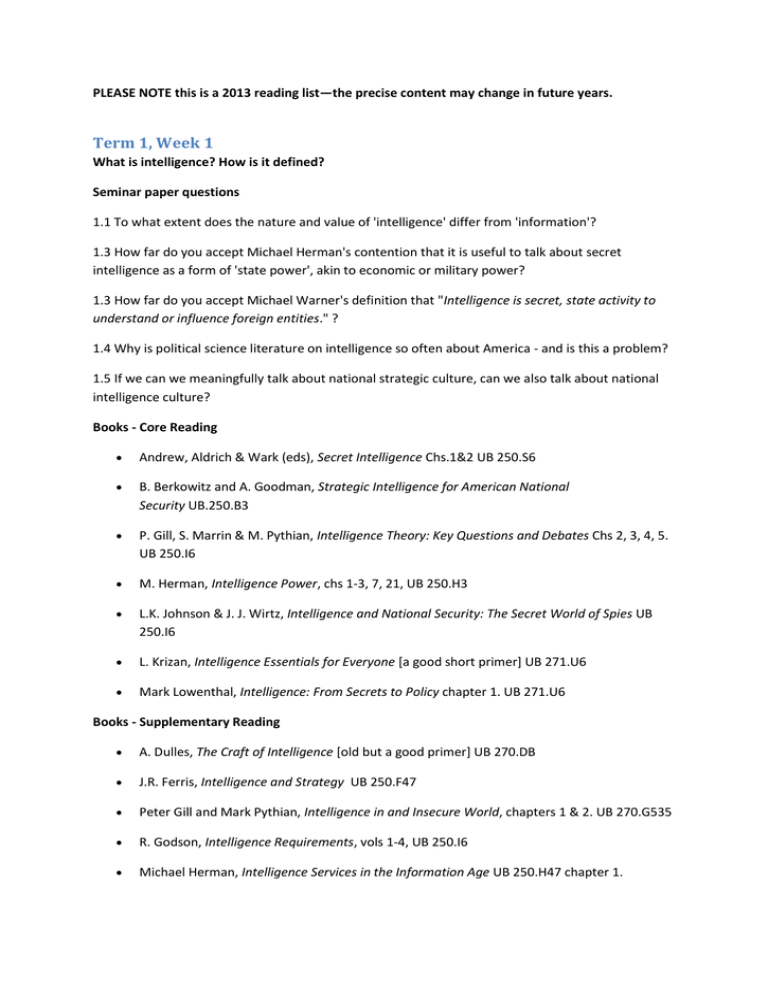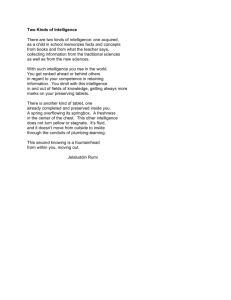Term 1, Week 1
advertisement

PLEASE NOTE this is a 2013 reading list—the precise content may change in future years. Term 1, Week 1 What is intelligence? How is it defined? Seminar paper questions 1.1 To what extent does the nature and value of 'intelligence' differ from 'information'? 1.3 How far do you accept Michael Herman's contention that it is useful to talk about secret intelligence as a form of 'state power', akin to economic or military power? 1.3 How far do you accept Michael Warner's definition that "Intelligence is secret, state activity to understand or influence foreign entities." ? 1.4 Why is political science literature on intelligence so often about America - and is this a problem? 1.5 If we can we meaningfully talk about national strategic culture, can we also talk about national intelligence culture? Books - Core Reading Andrew, Aldrich & Wark (eds), Secret Intelligence Chs.1&2 UB 250.S6 B. Berkowitz and A. Goodman, Strategic Intelligence for American National Security UB.250.B3 P. Gill, S. Marrin & M. Pythian, Intelligence Theory: Key Questions and Debates Chs 2, 3, 4, 5. UB 250.I6 M. Herman, Intelligence Power, chs 1-3, 7, 21, UB 250.H3 L.K. Johnson & J. J. Wirtz, Intelligence and National Security: The Secret World of Spies UB 250.I6 L. Krizan, Intelligence Essentials for Everyone [a good short primer] UB 271.U6 Mark Lowenthal, Intelligence: From Secrets to Policy chapter 1. UB 271.U6 Books - Supplementary Reading A. Dulles, The Craft of Intelligence [old but a good primer] UB 270.DB J.R. Ferris, Intelligence and Strategy UB 250.F47 Peter Gill and Mark Pythian, Intelligence in and Insecure World, chapters 1 & 2. UB 270.G535 R. Godson, Intelligence Requirements, vols 1-4, UB 250.I6 Michael Herman, Intelligence Services in the Information Age UB 250.H47 chapter 1. L. Johnson, Strategic Intelligence, Volume I. Understanding the Hidden Side of Government esp. chapters 1-3 UB 250.S6385 REF ONLY R.V. Jones, Reflections on Intelligence NIL J. Keegan, Intelligence in War, pp. 7-26, 321-52 UB 250.K4 S. Kent, Strategic Intelligence for American World Policy chapter 1 UB 250.K3 W. Laqueur, World of Secrets: The Uses and Limits of Intelligence pp.4-70 UB 271.U6 R.P. Pfaltzgraff et al (eds.), Intelligence Policy and National Security ch. 3. UB 250.I6 B. Porter, Plots and Paranoia (good on domestic security and high policing) NIL Abram N. Shulsky and Gary J. Schmitt, Silent Warfare: chapter 1. UB 250.S4 G. F. Treverton, Seth G. Jones, Steven Boraz, Phillip Lipscy, Toward a Theory of Intelligence Workshop Report, RAND B. Westerfield, Inside the CIA's Private World UB 271.U6 Articles - Core Reading Christopher Andrew, 'Intelligence, International Relations and "Under-theorisation"' in L.V. Scott & P.D. Jackson, (eds.), Understanding Intelligence in the Twenty-First Century: Journeys in Shadows, pp.29-41. [this book is alsoIntelligence and National Security, 20, 1 (2004)] UB 250.U53 Thomas Bruneau and Kenneth Dombroski, “Reforming Intelligence: The Challenge of Control in New Democracies,” in Thomas Bruneau and Scott Tollefson, (eds.) Who Guards the Guardians and How: Democratic Civil-Military Relations (Austin: University of Texas Press, 2006). P. Davies, 'Ideas of Intelligence: Divergent Concepts and National Institutions', Harvard International Review 24, 3 (2002): 62-66 P. Gill, ‘Theories of Intelligence’, in Loch Johnson (ed.) The Oxford Handbook of National Security Intelligence. L.K. Johnson, 'Preface to a Theory of Strategic Intelligence', International Journal of Intelligence and Counterintelligence 16, 4 (Winter 2003-2004): 638-663. D. Kahn, 'An Historical Theory of Intelligence', INS 16, 3 (2001): 79-92. Good on the issue of intelligence and international stability. D. Omand, 'Reflections on Secret Intelligence' in Peter Hennessy (ed.), The New Protective State pp.97-122. Also at - http://www.cscs.ucl.ac.uk/club/e-library/secret-int/ K.G. Robertson, 'Intelligence, Terrorism and Civil Liberties,' Conflict Quarterly 7/2 (1987): 4350 Jennifer Sims, 'The Theory and Philosophy of Intelligence, The Theory and Philosophy of Intelligence', in R. Dover, M. Goodman and C. Hillebrand, Routledge Companion to Intelligence Studies, Ch.4. L. Scott and P.D Jackson, 'Journeys in Shadows', Ch 1. in LV Scott and PD Jackson (eds.) Understanding Intelligence in the 21st Century [this book is also Intelligence and National Security, Vol. 20, No. 1 (Summer 2004)] UB 250.U53 M. Warner, 'Wanted: A Definition of '"Intelligence" ', Studies in Intelligence 46, 3 (2002): 1522 Michael Warner, 'Fragile and Provocative: Notes on Secrecy and Intelligence', Intelligence and National Security27/2 (2012): 223-240. Michael Warner, 'Theories of Intelligence: The State of Play', in R. Dover, M. Goodman and C. Hillebrand, Routledge Companion to Intelligence Studies, Ch.2. (London; Routledge, 2014) Articles - Supplementary Reading James De Derian, 'Anti-Diplomacy, Intelligence Theory and International Relations', INS 8, 3 (July 1993): 29-51. S. Farson, 'Schools of thought: National perceptions of intelligence', Conflict Quarterly 9/2 (1989) pp.52-104. Good on the issue of different national cultures of intellgence. J. Ferris, 'The Historiography of American Intelligence Studies', Diplomatic History 19, 1 (Winter 1995). M.R.D. Foot, ‘What Use Are Secret Services?’ in In the Name of Intelligence: Essays in Honor of Walter Pforzheimer, (eds.) Hayden B. Peake and Samuel Halpern, 277-282 M. Handel, 'The Politics of Intelligence', INS 2, 4 (October 1987): 5-46. L.K. Johnson, 'Bricks and Mortar for a Theory of Intelligence', Comparative Strategy 22, 1 (2003) Loch K. Johnson, 'Preface to a Theory of Strategic Intelligence,' International Journal of Intelligence and Counterintelligence 16/4 (2003): 638-663. A. Rathmell, 'Towards Postmodern Intelligence', INS 17, 3 (2002) pp.87–104. J. Sims, 'What Is Intelligence? Information for Decision Makers' in Roy S. Godson et al., eds., U.S. Intelligence at the Crossroads: Agendas for Reform, T.F. Troy, ’The 'Correct' Definition of Intelligence’ International Journal of Intelligence and Counterintelligence 5, 4 (Winter 1991-1992): 433-454. See also: Intelligence and National Security, 26/6 (2011) Special Issue: Intelligence in the Cold War: What Difference Did It Make? Specifically for the questions on culture, US dominance, alternative national approaches and ethnocentrism Books Philip H. J. Davies (Editor), Kristian C. Gustafson (Editor) Intelligence Elsewhere: Spies and Espionage Outside the Anglosphere, Georgetown 2013 Philip Davies, Intelligence and Government in Britain and the United States A Comparative Perspective 2 vols S. Farson, P. Gill, M. Phythian & S. Shpiro (eds.), PSI Handbook of Global Security and Intelligence: National Approaches: Volume 1 - The Americas and Asia, & Volume 2 - Europe, the Middle East and South Africa (Westport, CT: Praeger Security International, 2008). Michael Kackman, Citizen Spy: Television, Espionage, and Cold War Culture (University of Minnesota Press, 2005) Michael Schoenhals, Spying for the People: Mao's Secret Agents, 1949-1967, Cambridge UP 2012 A.Soldatov and I. Borogan, The New Nobility: The Restoration of Russia's Security State and the Enduring Legacy of the KGB, (New York: Public Affairs, 2010). Articles Intelligence and National Security, 26/4 (2012) Special Issue: Intelligence and Strategic Culture: Essays on American and British Praxis since the Second World War R.J. Aldrich & J. Kasuku, ‘Escaping From American Intelligence: Culture, Ethnocentrism and the Anglosphere’,International Affairs, 89/5 (2012). J. Anderson, "The Chekist Takeover of the Russian State", International Journal of Intelligence and Counter-Intelligence, 19/2 (2006): 237 - 288. Adda Bozeman, ‘Political Intelligence in Non-Western Societies: Suggestions for Comparative Research’ in Roy Godson (ed.) Comparing Foreign Intelligence: The U.S., the USSR, the U.K. & the Third World (Washington: Pergamon-Brassey’s International Defence Publishers, 1988). R. Callum, 'The Case for Cultural Diversity in the Intelligence Community', International Journal of Intelligence and Counter-Intelligence, 14/1 (2001). I. Duvesteyn, Intelligence and Strategic Culture: Some Observations, INS 26/4 (2011): 321-30. And also see the other essay in this special issue. Loch Johnson (ed.) Oxford Handbook of National Security Intelligence UB 250.O9 Part X - Intelligence in Other Lands ; Especially chapters 46, 47, 48 and 49. S.H. Campbell, 'A Survey of the U.S. Market for Intelligence Education', International Journal of Intelligence and CounterIntelligence, 24/2 (2011), pp.307 — 337. Colin S. Gray, “National Style in Strategy: The American Example,” International Security, 6/2 (Fall 1981), pp.21-22. Alastair Iain Johnston, ‘Thinking about Strategic Culture,’ International Security, 19 (Spring 1995), pp.36–43; Colin S. Gray, 'Strategic culture as context: the first generation of theory strikes back', Review of International Studies (1999), pp.49–69; Alastair Iain Johnston, 'Strategic Cultures Revisited: Reply to Colin Gray; Review of International Studies, 25/3 (Jul., 1999), pp.519-523. Robert L. Paarlberg, “Knowledge as Power: Science, Military Dominance, and U.S. Security”, International Security, 29/1, (Summer 2004), pp.122-151.

